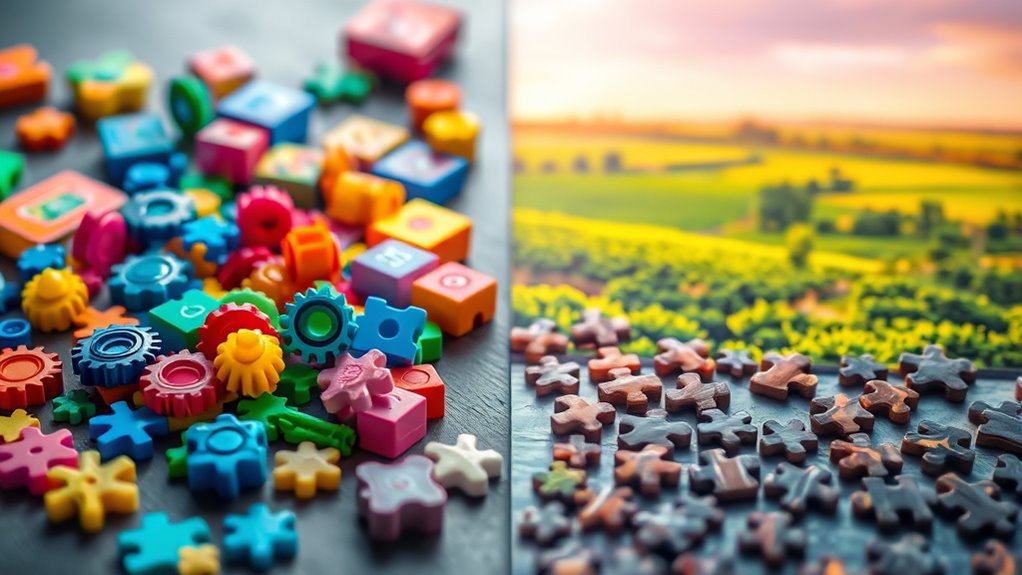Both brain games and puzzles help keep you sharper, but they do so in different ways. Brain games target specific skills like memory, attention, and problem-solving with adaptive challenges, while puzzles foster overall mental flexibility and strategic thinking. Mixing both into your routine boosts your cognitive resilience and keeps your mind engaged. To discover how combining these methods can maximize your mental sharpness, keep exploring these fascinating tools.
Key Takeaways
- Brain games target specific cognitive skills with adaptive difficulty, enhancing memory, attention, or problem-solving more directly.
- Puzzles promote broader mental agility, logical deduction, and strategic thinking through varied, multi-step challenges.
- Combining both methods offers a comprehensive approach, maximizing overall mental sharpness and adaptability.
- Regular engagement in either activity supports long-term brain health and helps prevent cognitive decline.
- Alternating between brain games and puzzles maintains interest and provides diverse mental exercises for optimal sharpening.

Have you ever wondered whether brain games or puzzles are more effective at boosting your mental skills? The truth is, both can play a significant role in cognitive enhancement, but their impact on your mental agility varies depending on how you use them. Brain games, often designed with specific algorithms, aim to target particular cognitive functions like memory, attention, or problem-solving. They tend to be engaging and interactive, offering immediate feedback that can motivate you to keep challenging yourself. Puzzles, on the other hand, like crosswords, Sudoku, or jigsaw puzzles, require you to apply logic, pattern recognition, and strategic thinking, which can improve your mental agility over time. Regular engagement with both can also help prevent cognitive decline as you age.
Both brain games and puzzles enhance cognitive skills, each offering unique benefits for mental agility and long-term brain health.
When it comes to cognitive enhancement, brain games typically focus on training isolated skills. For example, a memory game might help you recall information more efficiently, while an attention game could sharpen your focus. These games are often structured to adapt to your skill level, making the exercises progressively more challenging as you improve. The immediate feedback and game-like environment make them appealing for maintaining consistent mental workouts. Because of their targeted nature, they can be particularly effective at strengthening specific cognitive domains, especially if you stick with them regularly.
Puzzles, however, tend to offer a broader scope of mental engagement. Solving a Sudoku puzzle requires pattern recognition, logical deduction, and sustained concentration—all of which enhance your overall mental agility. Unlike some brain games that may focus narrowly on a single skill, puzzles often demand you to think flexibly and strategize multiple steps ahead. They also promote patience and perseverance, which are key to maintaining mental sharpness over the long term. As you solve different types of puzzles, you challenge your brain to adapt to new rules and scenarios, fostering a more versatile cognitive ability. Additionally, puzzles can help improve your problem-solving skills in real-world situations.
Ultimately, the most effective approach might be to combine both. Brain games can provide targeted improvements and keep your mental workout engaging, while puzzles help develop a well-rounded set of cognitive skills. By alternating between the two, you not only keep your routine interesting but also maximize your overall cognitive enhancement and mental agility. Remember, consistency is vital—regular mental exercises, whether through games or puzzles, will keep your brain sharp and adaptable as you age.
Frequently Asked Questions
How Often Should I Do Brain Games for Optimal Benefits?
You should aim for regular brain game frequency to see ideal brain training results. Doing brain games about 3 to 5 times a week keeps your mind engaged without overdoing it. Consistency is key, so schedule short sessions daily or every other day. This routine helps sharpen your cognitive skills, improves memory, and keeps your brain active. Remember, balance and regularity make your brain training most effective.
Are Digital Brain Games More Effective Than Traditional Puzzles?
When comparing digital vs traditional, effectiveness varies based on your preferences. Digital brain games often offer interactive features and instant feedback, which can boost engagement and motivation. Traditional puzzles like crosswords or jigsaw puzzles promote focus and problem-solving without screens. Both can be effective, but the best choice depends on what keeps you motivated and consistent. Try both to see which type enhances your mental sharpness more effectively.
Can Brain Games Prevent Age-Related Cognitive Decline?
While brain games might seem like a quick fix, they primarily offer neuroplasticity enhancement and mental agility training. You can’t rely solely on them to prevent age-related cognitive decline, but they can help keep your mind active. Combining brain games with physical activity and healthy habits creates a more effective strategy. So, stay engaged, challenge yourself, and incorporate diverse activities to support your cognitive health as you age.
What Age Groups Benefit Most From Brain Training Activities?
You’ll find that different age groups gain unique, age-specific benefits from brain training activities. Younger individuals improve their memory and problem-solving skills, while older adults enhance lifelong mental agility and slow cognitive decline. Engaging in these activities regularly helps maintain sharpness at any age. So, no matter your age, consistent mental exercises support your brain’s health, keeping your mind active, flexible, and resilient over the years.
Do Certain Puzzles or Games Target Specific Cognitive Skills?
Certain puzzles and games are designed to target specific cognitive skills. For example, crosswords and memory card games boost memory enhancement, while riddles and creative challenges stimulate your creativity. When you choose activities tailored to your goals, you can sharpen particular skills more effectively. So, if you want to improve memory or spark creativity, pick puzzles and games that focus on these areas to get the best mental workout.
Conclusion
So, whether you prefer the playful push of brain games or the challenging charm of puzzles, both boost your brainpower. By blending these brain-boosting activities into your daily routine, you’ll stay sharp, stimulated, and savvy. Remember, consistency is key—so keep conquering challenges, creating curiosity, and cultivating your cognitive core. Stay spirited, stay sharp, and let your mental muscles multiply with every move you make!









